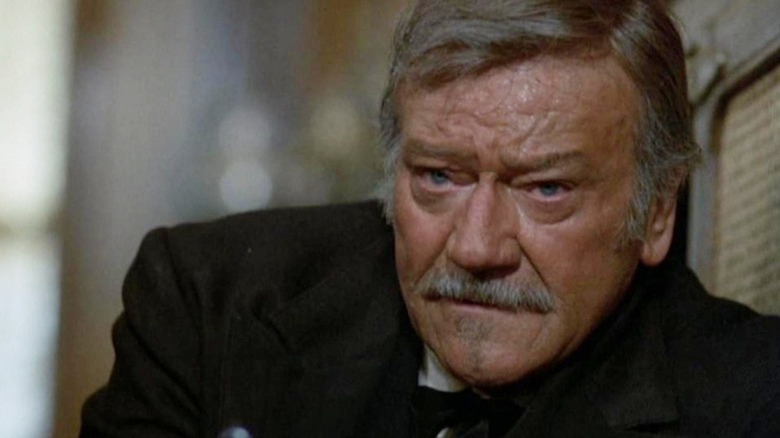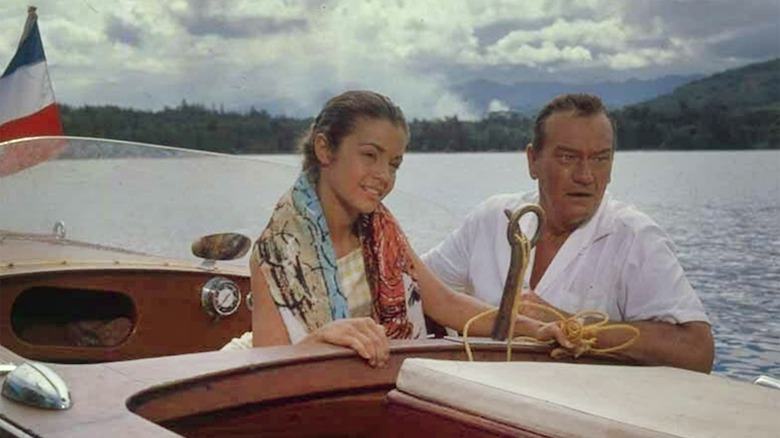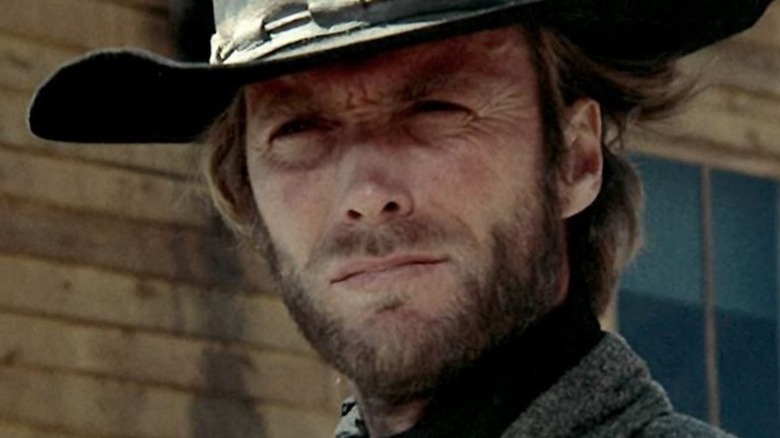Why John Wayne Refused To Join Clint Eastwood In A Thrilling Western
We may receive a commission on purchases made from links.
At the outset of the 1970s, John Wayne, arguably the biggest movie star of the 20th century, was making reasonably profitable movies at an impressively decent clip for a man who'd lost a lung to cancer. Though he looked considerably older than he was (a byproduct of heavy smoking, heavy drinking, and too many hours spent under the sun as an actor and an outdoorsman), he felt obliged to keep making films espousing conservative values for his aging fans and, whether they liked it or not, those goddamn pot-smoking, war-protesting, bra-burning Baby Boomers.
More often than not, Wayne's 1970s movies felt old-fashioned, but the actor, now in his 60s, was willing to tweak his image in order to keep up with moviegoers' changing tastes. After Wayne turned down the lead role in Don Siegel's "Dirty Harry" (a decision he regretted), he starred in the gritty-for-him cop drama "McQ." He also allowed himself to get killed off in Mark Rydell's "The Cowboys" as a means of teaching young folks a lesson about what it takes to be a man.
Wayne was willing to try stuff, but when it came to sharing the screen with the man who'd eclipsed him as the world's favorite Western star, the Duke was having none of it. On one hand, this was surprising; in terms of his political views and general temperament, Clint Eastwood was not all that different from Wayne. But when the younger star approached the Western icon with an appealing screenplay from skilled genre technician Larry Cohen, Wayne brusquely refused. Why was he so dead set against working with Eastwood?
John Wayne sent Larry Cohen's script to a watery grave
While speaking with Michael Doyle, the author of "Larry Cohen: The Stuff of Gods and Monsters," the writer-director of such horror classics as "God Told Me To," "It's Alive," and "Q: The Winged Serpent" told the disappointing tale of how Wayne repeatedly, angrily shot down the offer to co-star with Eastwood in a promising project that was then called "The Hostiles." The film would've starred Eastwood as a young gambler who wins half of an old gunslinger's ranch in a poker game. The two men stay on to protect their property and a young woman (who they're both sweet on) from a horde of bandits, which basically would've given Wayne the opportunity to do another Western siege flick (à la "Rio Bravo") with Eastwood.
Wayne, however, wasn't in the mood for torch passing at this point in his career. He rejected Eastwood outright the first time he was asked. At this point, Cohen thought he could persuade the blustery Duke by sending a copy of the screenplay to the star's son Michael, who agreed to hand his father Cohen's script while the pair were out on a boat fishing for the weekend. According to the younger Wayne, his dad would be bored out of his mind and, thus, open to reading a book to pass the time.
According to Cohen, this backfired in humiliating fashion. As he told Doyle:
"The following week, I got Michael on the phone and asked him what had happened. He said, 'Well, Dad was sitting on the boat and I handed him the script. He looked at it for a few minutes and then said, 'This piece of s*** again!' And then he threw it overboard.' I quietly thought to myself, 'Oh, there goes my beautiful script, slowly sinking beneath the blue Pacific along with the hopes and dreams of Clint Eastwood and Bob Barbash!'"
Unfortunately, Eastwood wouldn't make the film with anyone else but Wayne. Cohen pitched the star-director on legendary actors like George C. Scott or Burt Lancaster in Wayne's role, but Eastwood just wasn't uninterested in moving forward without The Duke.
Wayne's distaste for Eastwood stemmed from his hatred of High Plains Drifter
While Cohen called Wayne's snub the biggest heartbreak of his career, he could at least take a small bit of solace in knowing that Wayne's resistance had much more to do with his distaste for Eastwood's films than the screenplay.
While it's true that Wayne felt Cohen's script was something of a revisionist Western, he was more put off by the movies that had turned Eastwood into his genre successor. In an interview with the Los Angeles Times film critic Kenneth Turan, Eastwood said the Duke once wrote him a letter excoriating his 1973 hit "High Plains Drifter." Per Eastwood, "He said it wasn't really about the people who pioneered the West. I realized that there's two different generations and he wouldn't understand what I was doing. 'High Plains Drifter' was meant to be a fable; it wasn't meant to show hours of pioneering drudgery. It wasn't supposed to be anything about settling the West."
That letter snuffed out any hope that Wayne and Eastwood would ever share the big screen. (The former never had a chance to perhaps soften on his decision because he died at the age of 72 in 1979.) As for "The Hostiles," Cohen wound up selling the screenplay, which he co-wrote with Bob Barbash, to Hallmark in the late 2000s for $200,000. The screenwriter said he only did it to send half of the money to the deceased Barbash's widow and family — and it's a good thing he wasn't too invested in the project at this late date because he hated the movie they made out of it. How bad could the film, which was retitled "The Gambler, the Girl and the Gunslinger," be? Dean Cain was cast in Eastwood's role. That bad.


